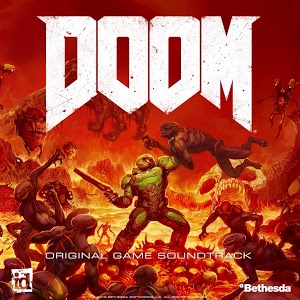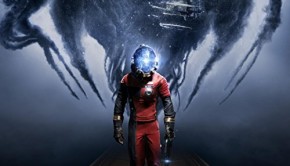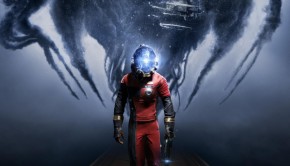DOOM Original Game Soundtrack
 |
Album Title: DOOM Original Game Soundtrack |
| Record Label: Bethesda Softworks |
|
| Catalog No.: N/A |
|
| Release Date: September 28, 2016 |
|
| Purchase: Download at iTunes |
Overview
Mick Gordon is without doubt the most popular game composer to have emerged this generation. The Australian composer enjoyed a spectacular rise from obscurity as he scored four major reboots in the space of four years: Killer Instinct, Wolfenstein, DOOM, and Prey. And with each released titles, he delighted players with bold, fresh, and memorable music that could be simultaneously enjoyed in-game and stand-alone. His latest work, the metal soundtrack for id Software’s DOOM, has proven his greatest hit to date — topping the soundtrack charts, winning multiple awards, and garnering rapturous fan applause. Let’s explore what this smash hit is all about…
Body
There are a lot of mainstream game soundtracks that have been described as ‘metal’: the hypermelodic anthems of Guilty Gear, the indulgent vocal tracks of Devil May Cry, and even the original 1993 edition of DOOM. However, 2016’s DOOM is the soundtrack that really captures the essence of ‘metal’ for me. Right off the mark, the soundtrack makes quite the statement with the relentlessly-paced, furiously-shredded guitar riffs of “Rip & Tear”. And fast forward 23 tracks later, with “SkullHacker”, the experience has only intensified and darkened. Influenced by Gordon’s collaboration with Meshuggah’s guitarist on The New Blood, most tracks have a strong Djent influences with their distorted low-pitch guitars. But it’s their character not their genre that defines them. DOOM is a confronting, abrasive, yet arguably empowering experience from start to finish. It’s best described in Mick’s own words: “you have your hand down the throat of the demon and you’re not running away scared.”
DOOM proves a surprisingly entertaining score despite its outward hostility. A great example is “Hellwalker”. For this track, Gordon ended up salvaging a vintage Russian synthesizer and putting a spotlight on its distinctive yet familiar sound. The call-and-response interplay that ensues between this synthesizer and the score’s trademark distorted guitars end up producing some of the score’s most lyrical and memorable moments. Another of the score’s most popular tracks, “BFG Division”, takes a similar approach by juxtaposing sweeping synthesizer phrases with the rousing guitar rhythms. It’s tracks like these that ensure that, while the soundtrack is often oppressive, it’s accessible and motivational enough to still be a highly enjoyable stand-alone experience. Additions later in the soundtrack, for example the gothic tones of “Dakhma” and “Damnation” or the hard electronic influences of “Transistor Fist” and “Vega Core”, ensure that the soundtrack keeps surprising listeners. What’s more, the soundtrack proves more rewarding with each listen since most tracks, even those that initially seem like blaring walls of sound, are filled with hidden rhythmical and timbral intricacies.
Another reason DOOM‘s soundtrack was so well-received is because it works excellently within the game. While the developers weren’t initially sold on a metal approach, Gordon managed to convince them that it was way to go. The score’s central focus, namely those hybrids of Djent metal with industrial and electronic element, in the end worked perfectly to reflect the demonic setting, claustrophobic atmosphere, and intense action of the game. On the finer-scale, the composer ensured that the main gameplay tracks vary adaptively depending on the level on on-screen action. As such, the music in tracks such as “Rust, Dust, and Guts”, “BFG Division”, and “Harbinger” range from tense ambient soundscapes to all-out shredding. They’re strung together into cohesive 7+ minute suites on the soundtrack. There are also a few quieter tracks used to depict the underworld, such as “Impure Spectrum”, “Dr Samuel Hayden”, “Incantation”, and “Lazarus Waves”, in which Gordon used all sorts of distortion techniques to capture the descent into hell. While hardly as striking as the central offerings, they’ll fascinate audiophiles for their corrupted timbres and bring some welcome breaks to the stand-alone experience.
Above all, Gordon found the right tone for DOOM. For all its apocalyptic overtones, it’s clear that deep down that Gordon also had a lot of fun writing this soundtrack and didn’t take himself too seriously. This is clear throughout the original score, which is often over-the-top without bordering on ridiculous, again all the way from “Rip & Tear” to “SkullHacker”. To make this even clearer, Gordon introduces each of the four main sections of the album with a demonic narration track. Although not all will enjoy them, they’re an irreverent tongue-in-cheek reference to those more pretentious metal albums out there. It’s all helped by Gordon’s references to past scores in the series, most directly with the famous E1M1 theme in “At Doom’s Gate” and the DOOM 3 theme in “Harbinger”. While brief, the former track is especially enjoyable for the way Gordon reinvigorates the classic guitar riff with his deep, gritty performance on his 9-string Schecter. The tribute reflects that both the 1993 and 2016 had similar intentions with their metal influences, but were ultimately made in different eras.
Summary
DOOM is an incredible accomplishment from Mick Gordon. Almost single-handedly responsible for composing, performing, and implementing the entire DOOM score, he defied the initial wishes of developers to create an altogether fresher, bolder experience. This soundtrack definitively demonstrates that, in an era where most game music plays it safe, the truly innovative creations will reap rewards. I hope that the mainstream popularity of this album and its composer will encourage more artists and producers to step out of their comfort zones and defy current conventions. Indeed, just as Koji Kondo, Nobuo Uematsu, and Martin O’Donnell respectively defined game music in the last three decades, I naively hope that the industry’s most recent breakout composer Mick Gordon will do the same this decade.
Do you agree with the review and score? Let us know in the comments below!
4.5
Posted on January 17, 2017 by Chris Greening. Last modified on January 18, 2017.















Interesting to read that this soundtrack was the one that best captured the essence of ‘metal’ for you Chris. Funnily enough (and without having listened to the DOOM soundtrack other than a few bits here and there), the game score that I thought was most ‘metal’ is 99 Levels to Hell – clearly, this particular setting inspires composers to reach for those amplifiers that go up to 11. Looking forward to giving Mick Gordon’s soundtrack a listen.
I’ve made an edit to ‘mainstream game soundtracks’ as you’re right 99 Levels to Hell fits the bill!